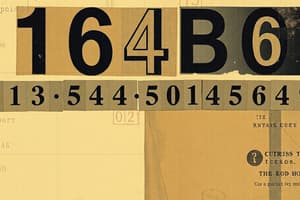Podcast
Questions and Answers
What is the smallest number expressible as the sum of two cubes in two different ways?
What is the smallest number expressible as the sum of two cubes in two different ways?
1729
What is a sequence?
What is a sequence?
A function whose domain is the set N of natural numbers.
Which of the following is a type of sequence?
Which of the following is a type of sequence?
- Finite sequences
- Infinite sequences
- Both A and B (correct)
- None of the above
If a sequence has a finite number of terms, it is called a ______ sequence.
If a sequence has a finite number of terms, it is called a ______ sequence.
What formula is used to find the nth term of an arithmetic progression (A.P.)?
What formula is used to find the nth term of an arithmetic progression (A.P.)?
In the arithmetic progression 4, 7, 10, 13,..., what is the common difference?
In the arithmetic progression 4, 7, 10, 13,..., what is the common difference?
What is the sum of the first n terms of an A.P. represented as?
What is the sum of the first n terms of an A.P. represented as?
How many terms are there in the sequence 4, 7, 10, 13,...,82?
How many terms are there in the sequence 4, 7, 10, 13,...,82?
In an A.P., what does the rth term formula express?
In an A.P., what does the rth term formula express?
What is the first term 'a' and common difference 'd' in the A.P. where the 3rd term is 18 and the 7th term is 30?
What is the first term 'a' and common difference 'd' in the A.P. where the 3rd term is 18 and the 7th term is 30?
Study Notes
Sequence
- A sequence is defined as a function mapping natural numbers (N) to real numbers (R).
- Denoted as f(n) = tn, where n is a natural number. A sequence is represented by its range: {t1, t2, t3, ...}.
Real Sequence
- A real sequence has values that are a subset of real numbers (R).
- Examples include:
- (i) 2, 5, 8, 11, ...
- (ii) 4, 1, -2, -5, ...
Types of Sequence
- Finite Sequences: Contain a limited number of terms.
- Infinite Sequences: Extend indefinitely with an infinite number of terms.
- Example: For tn = (\frac{(-2)^n}{(-1)^n + 2}), specific terms yield a sequence of values.
Series
- A series is formed by the addition or subtraction of a sequence's terms.
- If a1, a2, ..., an are terms of a sequence, then the series is expressed as: a1 + a2 + ... + an.
- Examples of series include:
- (i) 1 + 2 + 3 + ... + n
- (ii) 2 + 4 + 8 + 16 + ...
- (iii) -1 + 3 - 9 + 27 - ...
Progression
- The term "progression" refers broadly to sequences or series, both finite and infinite.
Arithmetic Progression (A.P.)
- An A.P. consists of terms generated by adding a constant number 'd' (common difference) to the previous term.
- A.P. representation: a, a + d, a + 2d, ..., a + (n - 1)d.
- Example: Sequence -4, -1, 2, 5.
nth Term of an A.P.
- The nth term in an A.P. can be calculated using the formula: (tn = a + (n - 1)d).
- Here, 'a' is the first term and 'd' is the common difference.
Sum of First n Terms of an A.P.
- The formula for the sum of the first n terms (Sn) of an A.P. is:
- ( S_n = \frac{n}{2} [2a + (n - 1)d] )
- For n odd: ( S_n = [a + \lambda] t_{(n + 1)/2} ) where λ is the last term.
Example Calculations
-
Finding the number of terms in A.P. (4, 7, 10, ..., 82):
- Use (82 = 4 + (n - 1)3) to determine that n = 27.
-
For an A.P. where the 3rd term is 18 and the 7th term is 30:
- Establish relations to find a and d, yielding the sum ( S_{17} = 612 ).
Sum of Odd Numbers Between 1 and 1000 Divisible by 3
- Odd numbers sequence within the range includes 3, 5, 7, ..., 999; filtering for multiples of 3 results in a subset of terms.
Studying That Suits You
Use AI to generate personalized quizzes and flashcards to suit your learning preferences.
Description
Explore the fascinating world of sequences and series in this quiz. Learn about their definitions, properties, and the significant contributions of mathematicians like S. Ramanujan. Test your understanding and deepen your knowledge of this essential mathematical concept.




